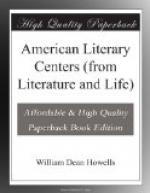After the Pacific Slope, the great Middle West found utterance in the dialect verse of Mr. John Hay, and after that began the exploitation of all the local parlances, which has sometimes seemed to stop, and then has begun again. It went on in the South in the fables of Mr. Joel Chandler Harris’s Uncle Remus, and in the fiction of Miss Murfree, who so long masqueraded as Charles Egbert Craddock. Louisiana found expression in the Creole stories of Mr. G. W. Cable, Indiana in the Hoosier poems of Mr. James Whitcomb Riley, and central New York in the novels of Mr. Harold Frederic; but nowhere was the new impulse so firmly and finely directed as in New England, where Miss Sarah Orne Jewett’s studies of country life antedated Miss Mary Wilkins’s work. To be sure, the portrayal of Yankee character began before either of these artists was known; Lowell’s Bigelow Papers first reflected it; Mrs. Stowe’s Old Town Stories caught it again and again; Mrs. Harriet Prescott Spofford, in her unromantic moods, was of an excellent fidelity to it; and Mrs. Rose Terry Cooke was even truer to the New England of Connecticut. With the later group Mrs. Lily Chase Wyman has pictured Rhode Island work-life with truth pitiless to the beholder, and full of that tender humanity for the material which characterizes Russian fiction.
Mr. James Lane Allen has let in the light upon Kentucky; the Red Men and White of the great plains have found their interpreter in Mr. Owen Wister, a young Philadelphian witness of their dramatic conditions and characteristics; Mr. Hamlin Garlafid had already expressed the sad circumstances of the rural Northwest in his pathetic idyls, colored from the experience of one who had been part of what he saw. Later came Mr. Henry B. Fuller, and gave us what was hardest and most sordid, as well as something of what was most touching and most amusing, in the burly-burly of Chicago.
III.
A survey of this sort imparts no just sense of the facts, and I own that I am impatient of merely naming authors and books that each tempt me to an expansion far beyond the limits of this essay; for, if I may be so personal, I have watched the growth of our literature in Americanism with intense sympathy. In my poor way I have always liked the truth, and in times past I am afraid that I have helped to make it odious to those who believed beauty was something different; but I hope that I shall not now be doing our decentralized literature a disservice by saying that its chief value is its honesty, its fidelity to our decentralized life. Sometimes I wish this were a little more constant; but upon the whole I have no reason to complain; and I think that as a very interested spectator of New York I have reason to be content with the veracity with which some phases of it have been rendered. The lightning—or the flash-light, to speak more accurately—has been rather late in striking this ungainly metropolis, but it has already




